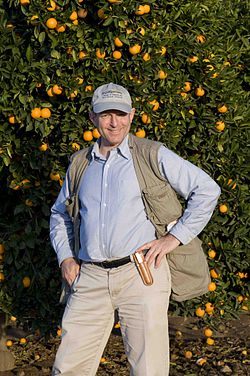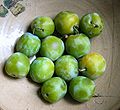- David Karp (pomologist)
-
For other people named David Karp, see David Karp (disambiguation).
David Karp 
David Karp
in front of an orange tree
at the
"Citrus Variety Collection"
of the
University of California, Riverside.Birth name David Karp Born 1958
Los AngelesNationality American Field Pomologist/Writer Training Graduated from Wesleyan University, Middletown, Connecticut, in 1979 with a B.A. in Late Antique Studies, Magna Cum Laude, Phi Beta Kappa. David Karp (born 1958) is an active pomologist, traveler and writer,[1][2] who calls himself a Fruit detective.[3]
David was born to his father, Harvey Karp, an extraordinarily successful businessman, whose East Hampton home was reputed to be a palace.[1] He was fluent in Latin when he graduated High School. At 20, while majoring in medieval art studies at Wesleyan University, he published a translation of the 6th-century Latin author Venantius Fortunatus.
After graduation, he started a successful career in risk arbitrage and option trading on Wall Street, has worked for gourmet specialty store Citarella and acted as a provisioner for Dean & DeLuca. Recovering from a serious drug addiction, however, he changed course and began a new career as a freelance fruit writer.[1][4]
Karp moved to California in 1999.[1]
Contents
Writings
Karp's photographs and writings currently appear in his weekly column Market Watch at the Los Angeles Times; and he has written many articles for the New York Times, Wall Street Journal, Gourmet, Smithsonian, Sunset, Star-Ledger and Saveur publications.[2][5] He can be found regularly at the Santa Monica, California farmers market[1] where he is a guest on the Saturday morning food show on radio station KCRW.[6]
When the threat of citrus greening first appeared in the U.S., David Karp wrote in the New York Times to alert the public of the disease's risks.[7]
Projects
Citrus Documentation at CVC
Karp is an associate in the Agricultural Experiment Station at the University of California, Riverside,[8] working to photograph and document the 1,000+ varieties grown at the Citrus Variety Collection of the University of California, these photos are displayed on the CVC website, and are accessible to researchers throughout the world.
Citrus Germplasm in China
He helped co-found the Chinese Citrus Germplasm Repository, in Jiangshui (about 50 miles from Kunming), province of Yunnan.[2]
Bunyard Orchard
Karp is also co-founder of the Bunyard Orchard of heirloom stone fruit in Morgan Hill, California.[9]
Unforbidden Fruit
Karp became involved as a researcher in a joint project between the University of California, Riverside and the USDA to prevent smuggling of fruit into California that may harbor insects that could threaten the state’s fruit industry. The project named “Unforbidden Fruits: Preventing Citrus Smuggling by Introducing Varieties Culturally Significant to Ethnic Communities”, focuses on making disease-free germplasm of citrus and non-citrus fruit available to California nurseries and tree farmers, to replace the illicit demand.[2]
A non-citrus fruit that the project has targeted is "tejocote" (Crataegus mexicana, sometimes called Crataegus pubescens), a fruit that is grown in the highlands of Mexico. Because it was not being grown in the U.S., it was often smuggled into the country and sold to Mexicans who wanted to use it to serve the traditional fruit drink called Ponche at Christmastime. Now that tejocote is being grown legally in California, much of the smuggling into the country has dropped off.[2]
RosBREED
David is a member in the "extension advisory panel" for the RosBREED organization that is dedicated to improve rosaceae crops through marker assisted crossbreeding.[10]
Fruits of Interest
Mangosteen
David has written several articles on the availability of the Mangosteen in the United States, due to fears they harbor the Asian fruit fly. He wrote articles in the New York Times announcing the renewed U.S. law on July 23, 2007 when irradiated imports from Thailand were allowed upon USDA approval,[11][12] and one following its trade at the local markets.[13]
As a member in the American Pomological Society he wrote a full review in the Journal of the American Pomological Society 64(1):5-13 about its commercialization in the United States.
Greengage Plum
David believes the Greengage plum is the most delicious fruit on the world,[3] and traveled to Moissac, France, (its primary center of cultivation), to investigate it.[14]
References
- ^ a b c d e Seabrook, John (August 19, 2002), "Our Far-Flung Correspondents, The Fruit Detective", The New Yorker, http://www.booknoise.net/johnseabrook/stories/culture/detective/index.html
- ^ a b c d e Torgrimson, John (Summer 2010). Member Profile: David Karp; International Fruit Hunter; Seed Savers Exchange Magazine. pp. 12–14.
- ^ a b Crawford, Amy (July 1, 2006), "An Interview with Author David Karp, Fruit Detective", Smithsonian.com: 1–2, http://www.smithsonianmag.com/people-places/karp.html
- ^ Willametta Classical Studies
- ^ The Splendid Table
- ^ Schnabel, Tom (WED AUG 5, 2009), "David Karp", KCRW, http://www.kcrw.com/music/programs/gd/gd090805david_karp
- ^ Deadly Pathogen Harms Florida Citrus Groves
- ^ California Rare Fruit Growers
- ^ Caliber
- ^ RossBREED
- ^ Karp, David (June 27, 2007). "Welcome at the Border: Thai Fruits, Once Banned". The New York Times. http://www.nytimes.com/2007/06/27/dining/27frui.html. Retrieved May 22, 2010.
- ^ Karp, David (August 9, 2006). "Forbidden? Not the Mangosteen". The New York Times. http://www.nytimes.com/2006/08/09/dining/09mang.html?ex=1312776000&en=0d1a76f2087e406d&ei=5088&partner=rssnyt&emc=rss.. Retrieved May 22, 2010.
- ^ Karp, David (August 8, 2007). "Mangosteens Arrive, but Be Prepared to Pay". The New York Times. http://www.nytimes.com/2007/08/08/dining/08mang.html. Retrieved May 22, 2010.
- ^ Karp, David (September 1, 2004), "A Finicky Fruit Is Sweet When Coddled", New York Times, http://www.nytimes.com/2004/09/01/dining/01GREE.html?pagewanted=print&position=
Karp, David (June 18, 2008), "Sweet Rewards for Apricot Explorers", New York Times, http://www.nytimes.com/2008/06/18/dining/18apricot.html
Karp, David (November 8, 2000), "Persimmons: A quest for the cinnamon persimmon uncovers a world of distinctive fruit", Los Angeles Times: H1, H3, http://articles.latimes.com/2000/nov/08/food/fo-48522
Karp, David (January 22, 2003), "An Orange Whose Season Has Come", New York Times: D1, D7, http://www.nytimes.com/2003/01/22/dining/an-orange-whose-season-has-come.html?pagewanted=1
Karp, David (October 30, 2002), "Pomergranates For One And All", New York Times: D1, D6, http://www.nytimes.com/2002/10/30/dining/30POME.html?pagewanted=1
Karp, David (September 2000), "Shades of Noir", Gourmet Magazine, http://www.gourmet.com/magazine/2000s/2002/07/shades_of_noir
Karp, David (July 2002), "Grown in the USA", Gourmet Magazine, http://www.gourmet.com/magazine/2000s/2000/09/USAgrown
Categories:- American writers
- Pomologists
- Wesleyan University alumni
- Living people
- 1958 births
Wikimedia Foundation. 2010.



